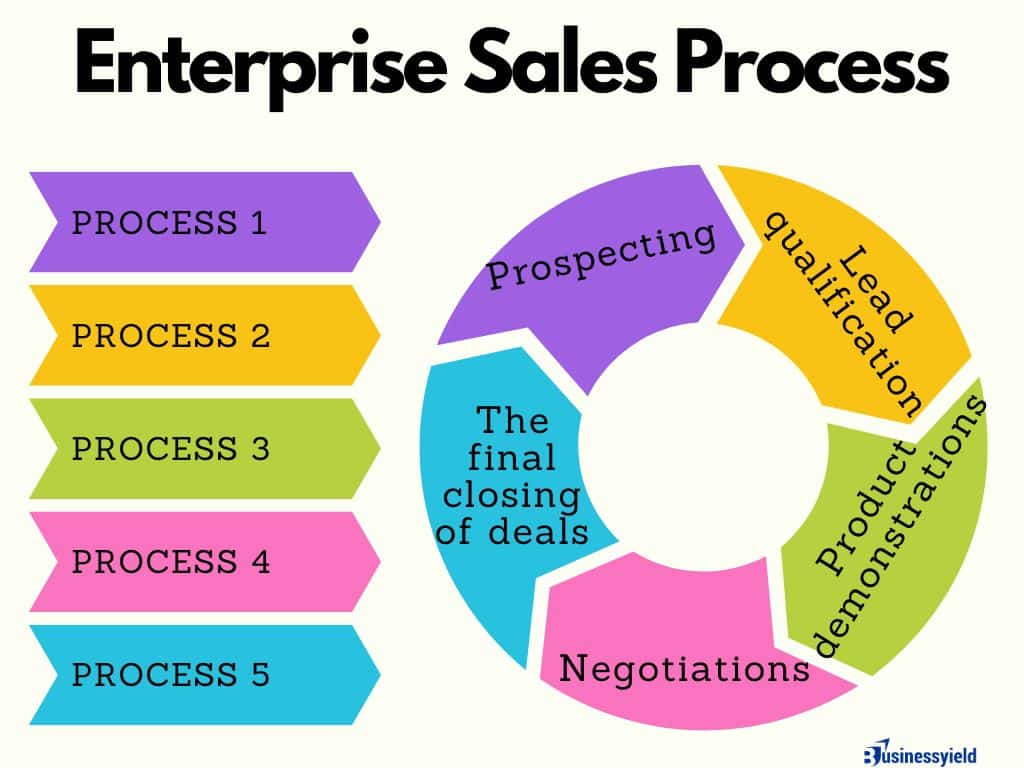Imagine you are a sales representative stepping into a corporation’s headquarters armed with your pitch and product knowledge. As you sit down with the decision-makers, you realize that selling to corporations requires a different approach compared to selling to individuals. This is where the world of enterprise sales comes into play. In this article, I’ll enlighten you on enterprise sales, the job description, and some examples of selling to corporations.
Also, I will give you insights and strategies to help you excel in this challenging yet rewarding field. So, whether you’re a seasoned sales professional looking to level up your game or a newcomer eager to learn the ropes, I got you covered with the knowledge and tools needed to thrive in the competitive world of enterprise sales.
Key Points
- Enterprise sales typically involve longer sales cycles compared to smaller deals. It requires patience, persistence, and a strategic approach to navigate through the complex decision-making processes within large organizations.
- Providing customized solutions to address the specific pain points of enterprise customers is essential; demonstrating how the proposed solution aligns with their business objectives and can deliver significant value is key to closing deals in enterprise sales.
- This often requires collaboration across different departments within the selling organization, including sales, marketing, and product development.
- Even providing ongoing customer support and nurturing relationships after the sale is closed can lead to repeat business and referrals in the enterprise market.
What Is Enterprise Sales?
When you hear enterprise sales, it’s not just dealing with routine business dealings or quick wins. No, it means entering a domain where the stakes are high, the customers are discerning, and the sales process can be a complex dance between multiple stakeholders.
Enterprise sales, in simple terms, can be likened to the process of selling products or services to large companies or organizations. This type of sales involves dealing with complex sales cycles, multiple decision-makers, and high-value deals.
To delve a bit deeper, I’ll give you an instance. Imagine a scenario where a software company is looking to sell its advanced analytics platform to a Fortune 500 company. In this situation, the sales team would need to navigate through various departments. This includes IT, finance, and operations to showcase how the software can bring value to each department and the organization. Moreover, enterprise sales often involve long sales cycles, comprehensive contract negotiations, and a focus on building long-term relationships with clients.
In essence, enterprise sales require a strategic and consultative approach. This will help you understand the needs and challenges of large organizations and solutions that address these needs effectively. That’s more about fostering partnerships and providing ongoing support rather than just making a one-time transaction. By focusing on creating value for the customer and building strong relationships, enterprise sales can lead to significant revenue growth and business success for both the seller and the buyer.
Enterprise Sales Job Description
Understanding the enterprise sales job description helps alot. In this role, the primary focus is on understanding and meeting the needs of large corporate clients. Hence, here are some essential elements of an enterprise sales job description:
#1. Developing and implementing sales strategies
Enterprise sales professionals are expected to develop comprehensive sales strategies that align with the company’s goals and objectives. This includes identifying target markets, creating sales plans, and executing tactics to achieve sales targets. You may be asking, how? Well, I’ll guide you.
One effective strategy is to conduct thorough market research to understand industry trends, competition, and customer needs. For instance, a software company looking to expand its enterprise sales may identify a specific vertical market. It can be healthcare, where there is a growing demand for technology solutions.
Once the target markets are identified, creating tailored sales plans is key to success. This involves setting clear objectives, defining sales targets, and outlining the steps needed to reach them. For example, a sales plan for a B2B enterprise software solution provider may include targeting key decision-makers in healthcare organizations, offering personalized demos, and providing competitive pricing packages.
Also, executing tactics to achieve sales targets requires a well-coordinated effort from the sales team. This can involve leveraging networking opportunities at industry events, nurturing relationships with potential clients through follow-up calls and emails, and providing exceptional customer service to build long-term partnerships. For more sales tactics, read this article SALES TACTICS: All To Know (Plus + Proven Sales Tactics)
#2. Building and maintaining relationships
A crucial aspect of enterprise sales is establishing long-term relationships with clients. Sales professionals need to nurture existing partnerships and foster new connections with potential clients to drive business growth.
For example, sales professionals can maintain relationships. That’s providing excellent customer service, personalized solutions, and consistent communication to meet the client’s evolving needs. Additionally, fostering new connections with potential clients involves networking, attending industry events, and engaging with leads through tailored marketing strategies.
#3. Understanding customer needs
Enterprise sales professionals must have a deep understanding of their client’s business challenges and goals. By comprehending customer needs, sales professionals can tailor their sales pitch and offer customized solutions that add value to the client’s business.
For example, if a sales professional is working with a client in the technology sector who is facing challenges with outdated IT infrastructure and network security, they must comprehend the specific issues the client is dealing with.
Then with these challenges, the sales professional can tailor their sales pitch. This will help them focus on how their product or service can address these concerns. They may highlight how their solution can modernize the client’s IT infrastructure, improve network security, and ultimately help the client achieve their business goals of increased efficiency and data protection.
#4. Negotiating contracts and closing deals
Negotiating contracts and closing deals is another aspect of the enterprise sales job description. It requires a combination of strategic thinking, communication skills, and persistence. When negotiating contracts, the main goal is to reach a mutually beneficial agreement that satisfies both parties involved.
When negotiating contracts, first, always start by thoroughly reviewing the terms and conditions. This helps to ensure they are fair and beneficial for your client. Then, engage in discussions with the other party to find common ground and reach a mutually agreeable solution.
During these negotiations, remain calm and professional, even in challenging situations. Listen actively to the other party’s concerns and perspectives, while also effectively articulating your client’s needs and expectations.
Once a consensus is reached, the next step is to close the deal. This involves ensuring that all terms are clearly outlined in the contract and that both parties fully understand and agree to them. Make sure to address any remaining issues or questions promptly to avoid any misunderstandings or delays in finalizing the agreement.
In closing deals, I find that maintaining open lines of communication and being transparent about the process helps to build trust and strengthen relationships with clients and partners. One memorable closing experience was when I successfully sealed a significant sales contract after months of negotiation. The final stages involved ironing out the finer details and overcoming the last-minute hurdles. Hence, staying persistent and maintaining a positive attitude, helped me to secure the deal and celebrate a win for both parties. Read more on How To Close a Sale: Beginner’s Guide To Sale.
#5. Collaborating with internal teams
Collaborating with internal teams is key to achieving success in any organization. From my experience, I have found that working effectively with colleagues from different departments or functions can lead to increased efficiency and productivity.
When I collaborate with internal teams, I first ensure to communicate openly and clearly to establish mutual understanding and objectives. This helps in aligning everyone towards a common goal and ensures that all team members are on the same page.
Additionally, I believe in fostering a culture of trust and respect within the team. By listening to different perspectives and valuing the input of my colleagues, we can leverage our collective strengths and expertise to tackle challenges and drive innovation.
Furthermore, I always prioritize effective teamwork and collaboration over individual achievements. Moreover, I understand that by working together harmoniously, we can achieve better results and make a greater impact within the organization.
Is Enterprise Sales Lucrative?
In my experience, enterprise sales can be a complex and challenging field to navigate. It requires a deep understanding of the specific industry, the ability to build strong relationships with key stakeholders, and the patience to navigate long sales cycles. The potential for high rewards is certainly there. That’s to say landing a big enterprise deal can have a significant impact on your revenue and commission.
However, note that enterprise sales can also come with its own set of challenges. Competition can be fierce, and winning over enterprise clients often requires a substantial investment of time and resources. Additionally, some industries may be more resistant to change or hesitant to invest in new solutions. This makes the sales process even more arduous.
That being said, I’ll answer your question with some instances. For those who can successfully navigate the complexities of enterprise sales, the potential for lucrative financial rewards is certainly there. Besides, landing a few major deals can greatly boost your income and open up new opportunities for growth and advancement within the company. In essence, enterprise sales can indeed be lucrative, but it requires dedication, persistence, and a strategic approach to truly capitalize on its potential. For more insight, download the checklist below!
How To Build A Succeed Enterprise Sales Strategy
Examples Of Enterprise Sales
When it comes to enterprise sales, there are many industries and sectors where this type of sales strategy thrives. Personally, I have seen enterprise sales in various firms and some of the examples include:
#1. Software Solutions
Software solutions refer to programs and applications designed to solve specific business needs or challenges. As an expert in enterprise sales, I understand the importance of providing software solutions that address the unique requirements of large organizations.
One example of a software solution for enterprise sales is Customer Relationship Management (CRM) software such as Salesforce. CRM software helps companies manage and analyze customer interactions and data throughout the customer lifecycle, ultimately improving sales and customer satisfaction.
Another example is Enterprise Resource Planning (ERP) software like SAP or Oracle. ERP software integrates different business functions such as finance, human resources, and supply chain management into one centralized system. That’s enabling organizations to streamline operations and make data-driven decisions.
Additionally, Sales Performance Management (SPM) software like Xactly or Anaplan helps companies optimize their sales processes. It also helps to incentivize sales teams, and improve overall sales performance.
#2. IT Services
Certainly, I have seen firsthand the vital role technology plays in driving business success. IT services encompass numerous solutions aimed at improving efficiency, security, and scalability within organizations. For example, cloud computing services such as Amazon Web Services (AWS) provide businesses with on-demand access to computing resources, enabling them to scale up or down based on their needs. Besides, this flexibility not only reduces operational costs but also enhances the overall agility of the business.
Furthermore, IT services also include cybersecurity solutions like Palo Alto Networks, which help enterprises protect their valuable data from cyber threats. With the increasing frequency and sophistication of cyber attacks, organizations need robust security measures to safeguard their sensitive information. So, if you invest in IT services like Palo Alto Networks, your business can proactively defend against potential breaches and mitigate risks effectively.
#3. Consulting Services
Consulting services are a crucial aspect of enterprise sales as they involve providing expert advice and guidance to businesses in various domains. This field plays a significant role in understanding the unique challenges and opportunities that enterprises face and offering solutions to help them achieve their goals.
One of the tools that I utilize in providing consulting services is data analytics software such as Tableau or Power BI. These tools help in analyzing large volumes of data to identify trends, patterns, and insights that can be used to make informed business decisions. Additionally, customer relationship management (CRM) platforms like Salesforce are valuable for managing client interactions and tracking sales leads effectively.
Moreover, project management tools such as Asana or Trello help in organizing tasks, tracking progress, and ensuring timely delivery of consulting services. In essence, these tools not only improve productivity but also enhance collaboration among team members and clients.
#4. Industrial Equipment
Enterprise sales also involve the process of selling large-scale machinery and tools to businesses for their manufacturing or operational needs. This requires understanding of the industrial sector, the equipment being sold, and how it can benefit the buyer’s operations.
Examples of industrial equipment commonly sold through enterprise sales include:
- Manufacturing machinery such as CNC machines, 3D printers, and assembly line equipment.
- Material handling equipment like forklifts, conveyors, and pallet jacks.
- Industrial tools and supplies such as power tools, welding equipment, and safety gear.
Meanwhile, to be successful in enterprise sales of industrial equipment, you should have a strong knowledge of the products being sold. Also, you should know how these tools can improve efficiency, increase productivity, and drive profitability for the buyer’s business. When you understand the needs and challenges of industrial customers, you can effectively tailor their pitch and offer solutions that meet those specific requirements.
#5. Financial Services
Enterprise sales in the financial services sector involve selling financial products or services to large organizations. This includes banks, insurance companies, and investment firms. Also, it requires a strategic approach to understand the complex needs of the enterprise and provide solutions that can scale to meet their requirements.
In enterprise sales within the financial services industry, sales professionals often work closely with others. They work with decision-makers and key stakeholders to navigate regulatory requirements, demonstrate compliance, and address specific challenges faced by the organization. This may involve selling software solutions for risk management, compliance monitoring tools, or customized financial products that cater to the enterprise’s unique demands.
Overall, successful enterprise sales in financial services require industry expertise, strong relationship-building skills, and a deep understanding of the complex financial landscape.
What Is An Enterprise Sales Process?
An enterprise sales process refers to the strategic approach a company takes to sell its products or services to other businesses on a larger scale. This process typically involves identifying potential enterprise clients, understanding their needs and challenges, and tailoring solutions to meet those specific requirements.
Basically, the enterprise sales process often includes multiple stages. This includes prospecting, lead qualification, product demonstrations, negotiations, and the final closing of deals. Unlike selling to individual consumers, enterprise sales involves more complex decision-making processes, longer sales cycles, and higher value transactions.

- Prospecting: Identifying potential customers and businesses who may have a need for the product or service.
- Lead qualification: Assessing the potential leads to determine if they are a good fit for the product or service.
- Product demonstrations: Presenting the features and benefits of the product or service to the potential customer.
- Negotiations: Discussing terms, pricing, and any possible customization with the customer to reach a mutually beneficial agreement.
- Closing of deals: Finalizing the sale by getting the customer’s agreement to purchase the product or service.
For more information on the sales process, I recommend this article to you
Sales Process: Steps & Stages to Close Sales Efficiently in 2023!!!
What Do Enterprise Sales People Do?
Enterprise salespeople are professionals who specialize in selling products or services to other businesses rather than individual customers. Assuming you’re an enterprise salesperson, you have lots of responsibilities. This includes identifying potential clients, building relationships with key decision-makers, understanding their specific needs and challenges, and ultimately persuading them to invest in your solutions.
For instance, you will conduct extensive research to target companies that align with our product offerings. Once you have identified a promising prospect, you would reach out to schedule meetings or demonstrations to showcase how your product can address their pain points and add value to their business operations.
Additionally, you may collaborate with internal teams such as marketing and product development to customize solutions for a client’s unique requirements. So, by leveraging your expertise and communication skills, you’ll secure long-term partnerships that drive mutual success and growth.
How Hard Is Enterprise Sales?
To answer this question, note that each profession comes with its own set of challenges and difficulties. In my opinion, no profession is easy. Having worked in enterprise sales, I can attest to the challenges that come with selling products or services to large firms.
The complexity of such sales demands a profound understanding of the customer’s requirements, adeptly navigating through numerous decision-makers, enduring lengthy sales cycles, and skillfully addressing objections. Notwithstanding, it’s a profession that requires resilience, strategic thinking, and a relentless pursuit of customer satisfaction.
What Is Enterprise? Detailed Guide
Revenue vs Sales: A Comprehensive Guide to Distinguishing Revenue From Sales
A COMPREHENSIVE GUIDE TO OUTSIDE SALES






